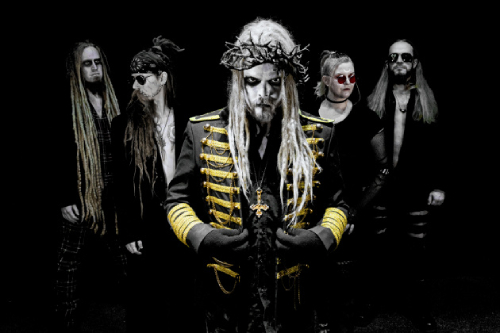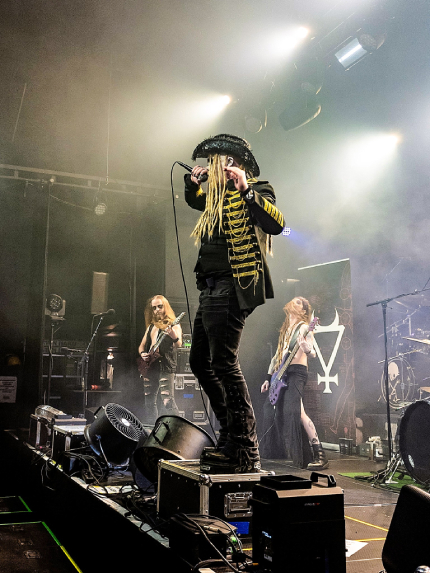

| Interview: | KING SATAN |
| Title: | Analytical symbiosis |
With their fourth full-length album „The Devil's Evangelion“, the Finnish chain blasters underpin their very own status in the field of Industrial Metal in an accomplished manner.
And as the revealing title already announces, the lyrics are once again completely without blinkers. According to band leader, composer and singer King Aleister Satan, the new output is a concept album that depicts a trickster-like experience of the world through the eyes of a person who is convinced of being possessed by the Devil.
„However, instead of experiencing this as exclusively malicious or negative, the perspective seeks to find meaning in things typically seen as malevolent, like chaos, pain, death, destruction, and darkness - and how these aspects can also be progressive, beautiful, and cathartic. To support this, musically, I wanted to walk that narrow bridge between melancholy and anger. I aimed to find connections between other seemingly opposite things as well, such as ritual and carnivalism, chaos and order, reason and absurdity, to name a few. The album heavily focuses on duality and the paradoxical nature of reality, which can also be seen in the title. 'Evangelion' means 'Good news' (Latin, evangelism) in a Biblical context, and the Devil is often seen as evil. I was particularly adamant and quite obsessed actually with what kind of material this album would include to ensure it served the concept. I don't think I've ever been so meticulous in the songwriting process before.“
 How do you see and rate the new full-length in the context of your adventurous musical journey so far?
How do you see and rate the new full-length in the context of your adventurous musical journey so far?
„In many ways, it’s truly the ultimate King Satan album, both musically and conceptually. We started as a very electro-industrial-oriented band in the beginning but gradually evolved more toward industrial metal and death metal disco after our second album. The Devil’s Evangelion is a summary of everything we've done before, bringing together earlier elements too with our current style. The early days' aggrotech and electro parts are now played with instruments rather than programmed, and the album includes more of the elements that were in the background before too, such as symphonic and black metal influences. Conceptually, it is both the most serious and darkest concept we've done, but also the most carnivalesque and absurd. This fusion brings everything we've done into one package thematically as well, because, after all, clowning is serious business, and chaos is the law.“
You wrote me, the new album "goes deeper and deeper the rabbit hole indeed, the rest songs might need indeed little big digesting, except for maybe 'Once Upon A Shadow' and 'Destroy the World' might be easy to digest like first song (New Aeon Gospel)… please go a bit deeper here.
„The album’s conceptual side, which I briefly explained earlier, required a specific dramatic arc to be unraveled to start to make sense in a way. This creates a feeling of "going deeper and deeper down the rabbit hole" as I mentioned earlier to you before this interview, yes. This applies to both the music and the theme. The meaning of this album doesn’t lie in just one or two songs, sentences, or chapters - it’s in the syntax of the whole album, which becomes clear when listened to in its entirety. However, I wanted a few straightforward songs to balance the dynamics, and in my opinion, those are the three songs I think serves that purpose on that album, 'New Aeon Gospel', 'Destroy The World' and 'Once Upon A Shadow’.“
How can the readers imagine you and the band writing, developing and finalizing one of the new songs?
„Usually, I make demos that include most of the instruments in one way or another in my home studio, until I feel I have atmospheric blueprints for an album. Then I present them to the band. They’re all much more talented and skilled musicians than I am, so this is where we start to work together and develop the songs further. This is also when other members show their demos, which might fit the album, and we work on those as well. I always have the concept and the bigger picture of the album in mind, so I act as the band’s art director, keeping the vision in mind as we proceed. However, I don’t want to dictate the entire form; I want to harness the best of my bandmates’ abilities to shape the concept together. For this album, I was more adamant than ever though because the concept had been developing in my mind for over a decade, even older than King Satan band itself, which I never felt ready to execute it until now.“
 Who out of you guys did the lion's share of the new song material - you?
Who out of you guys did the lion's share of the new song material - you?
„I did compose most of the material in the demo phase, and Pete Hellraiser is the first to join to develop after my start, as we brainstorm the drums together quite far. But everyone contributes after that. On this album, the lion's share of material originated from me, as usual. This time, 'Once Upon a Shadow' originated from EF-13, and 'Epilogue - The Phoenix Song' came from Jerry Rock’n’Roll, while the rest are mine. This is the first King Satan album where none of Hekate Boss’s songs made it onto the album, actually. But interestingly enough, Hekate acted as a producer for the first time at this capacity alongside with me because she understood musically what I wanted in some ways even better than I did, helping me to dig it out not only from me, but also from the other members too.“
How was the selection of songs for the album done - was it difficult or rather easy for King Satan?
„This time it was the easiest process because the album's concept was crystal clear even before the composition began.“
Is there and in case yes, what is the o-n-e song with the most meaning for you on „The Devil's Evangelion“ and why? You mentioned that you're specifically proud on the 'The Devils And Saints' track, which seems to be the most complex song also …
„Like I mentioned, the album’s thematic concept had been in development in my head and on paper for over a decade, so it’s ridiculously personal and meaningful to me that I don’t even to pretend to see it objectively. It’s the ultimate testament to my obsession with the archetype of the Devil. So, there isn’t one song that has the most meaning to me. However, 'The Devils And Saints', which is a theater-like dialogue inspired by Plato and Shakespeare, stands out its different style. I’m particularly proud of creating a song like this again, after my old band Saturnian Mist’s 'Sacrifice Of Faces Unbroken'. Presenting dialogue in the form of extreme metal is quite an intense way to explore complex, abstract, and paradoxical issues - not to mention, really challenging to put together.“
Please bring the readers closer to the main lyrical content of your new album release, you describe it as a "conceptual album" and you mentioned "lyrics highly related, all connected, and most philosophical too!"
„The moods and visions I described in my first answer could easily apply to this question as well. Our new label is actually releasing a hardcover lyrical book with interview bonus materials titled 'The Devil’s Evangelion And The Law Of Chaos', which includes all King Satan lyrics along with some interview excerpts. This will give a more holistic view of this side of things because I feel interviews don’t allow enough room to delve into the ridiculous depths of these topics as I’d like to. For those interested, I highly recommend it!“
Are there any things, books, movies, etc. that have influenced you as artist and as musician for „The Devil's Evangelion“?
„For the first time ever, I can say that I am actually this album, at least thematically, and I've let a lot of things influence me over the years. So, the list of influences is endless when it comes to the thematic side. To choose just a few is difficult. Imagine a movie co-directed by Terry Gilliam, Quentin Tarantino, and Alejandro Jodorowsky, based on the works of Plato, Friedrich Nietzsche, C.G. Jung, Carlos Castaneda, Anton LaVey, Aleister Crowley, Fyodor Dostoevsky, Colin Wilson, Mikhail Bulgakov, Albert Camus, Hunter S. Thompson, H. P. Blavatsky, and Jiddu Krishnamurti, and produced by David Lynch, all centered around the folklores and myths regarding the archetype of the Devil. I don’t know how else to describe it. Musically, I aimed to blend the atmosphere of religious hymns, anthems, and psalms with extreme industrial metal, symphonic influences, and the raw energy of Rock’n’Roll. Instead of giving an endless list of influences, I like to share what our old agent said: King Satan is like Rob Zombie doing Death Metal on acid. And as one journalist once said: 'What if Rammstein and Slipknot had a baby, with maybe a little bit of Die Antwoord thrown in?’"
© Markus Eck, 25.10.2024
[ to overview ]
📢 PR Agency • 𝐸𝓈𝓉. 2001
🎯 Consistent 5✭ rated
🌐 Worldwide reach:
print, online, radio
⫸ Many years of extensive and in-depth experience in various musical fields form the basis for individual and efficient services.
⫸ In addition to communications for global Public Relations, the main areas of activity are integrated Promotion Campaigns, as well as Marketing, Artist Management, Consulting and Mentoring.
BlattTurbo
Bleeding4Metal
BURRN!
Crossfire Metal
Darkzen Dragon
Filthy Dogs Of Metal
Frenzy Fire
Groundcast
Heavy Metal Webzine It
Highwire Daze Online
Legacy
Metalheads Forever
Metal Gods TV
Metal Pedia
Metal Shock Finland
Metal Temple
Metal Titans
Metal Underground AT
MetalZone
Pete's Rock News And Views
Powermetal DE
Rock Garage
Saitenkult
Smorg Magazine
Sonic Realms
Stormbringer
The Cosmick View
The Murder Inn
Zephyr's Odem
1921 Baliheadbanger
Demontre Radio
Das Metalmagazin hart&direkt
Hijos De La Luna
La Caverna De Hierro
Metal Com Batata
PowerPlant Radio NL
Radio Diabolus
Rock Live Radio
Linktree
Instagram
Facebook
YouTube
Pinterest
TikTok
Tumblr
Blog
Wordpress
Bluesky
Threads
X
Disclaimer
Impressum
Datenschutzerklärung
© Metal Message ᴳᴸᴼᴮᴬᴸ • 2001-2026 • All rights reserved
Unauthorized use and/or duplication of this material without express and written permission from this site’s author and/or owner is strictly prohibited.
Excerpts and links may be used, provided that full and clear credit is given to Metal Message ᴳᴸᴼᴮᴬᴸ with appropriate and specific direction to the original content.



